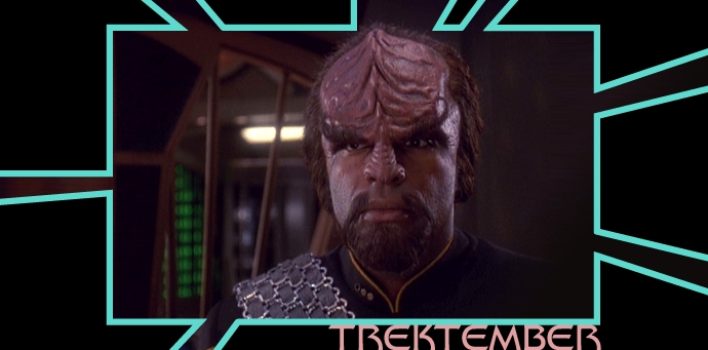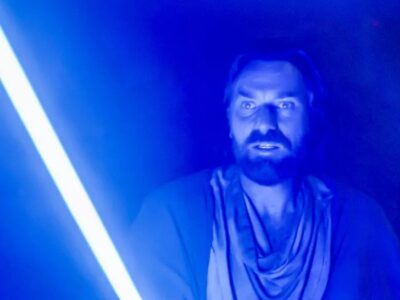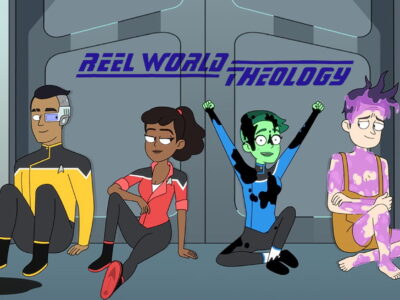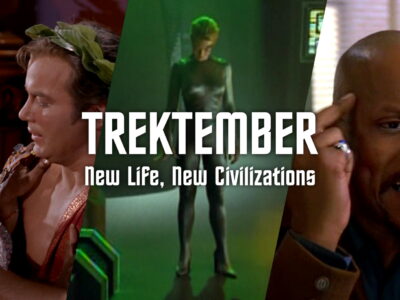Trektember: The Way of the Warrior
“Some things are worth waiting for…”
Benjamin Sisko’s remark at the beginning of season four is in reference to his paramour, Kasidy Yates, but for me it resonated with the episode itself and the whole series. This wasn’t just a midpoint for the seven-season show, but a tonal shift between two wrestling polarities of the Star Trek mythos.
Gene Roddenberry’s franchise has always wrestled with duality. While many speak of Trek in reverent tones as intellectual sci-fi that eschews violence, The Original Series had a fair share of fisticuffs, firing phasers and (as Galaxy Quest parodied so perfectly) a Captain always getting his shirt torn off. In truth, Star Trek: The Next Generation encapsulates what the average Trekker refers to in terms of a more space-pacifist, talk-to-solution series. So was the first Star Trek film, though its mixed reception thus gave birth to Nicholas Meyer’s film, The Wrath of Khan… which was effectively Horatio Hornblower in space with a return to villains, photon torpedoes, and falling sideways across a bridge set.
Deep Space Nine flirted with an edgier tone than its Picard-led predecessor. Sisko punching Q in season one established him as a tougher leader, but I didn’t feel they strayed far from TNG formula. In fact, in the 90’s I’d strayed from regular viewing and docked at Deep Space Nine’s WB sister station (Babylon 5). However, with “Warrior” in the title, Worf’s addition, and a shaved head for Avery Brooks (hearkening back to his tough guy look as Hawk from Spencer: For Hire) it seemed clear that change was in the air… or space… or the vacuum of space… you get the idea.
Sic vis pacem para bellum
Sisko mentions that “modifications are being made” to the station. This turns out to be the armaments that make DS9 a true “battle station,” weapons of mass destruction discreetly built into the station’s structure. And when they emerge in act three, despite Gowron’s scoffing certainty that it has to be a ruse, I was whisked back to my childhood watching Star Blazers as cannons rose on the deck of the Yamato. And I smiled.
Roman General Vegetius said, “If you want peace, prepare for war.” Sisko, his crew, and the Federation clearly want peace above all, but between the Dominion and the escalation of Klingon hostility we see the idea of preemptive planning for potential warfare. Then and now, this chafes with some Trekkers and spiritual thinkers, but the episode clearly takes a side in the debate. The important difference between the Klingons and the Federation in this episode is that the Klingons initiate preemptive attack, whereas Deep Space Nine initiates preemptive fortification and a willingness for defense. They want peace; they’re preparing for war.
Gowron’s incredulity at that moment seems to be, if not philosophical commentary, a winking nod to The Next Generation. “It’s an illusion… they’re using energy fields and tricks to make us THINK they have weapons,” the Klingon leader growls dismissively. How many times did the Enterprise-D do something just like that? I lost count. However, Deep Space Nine – and Star Trek itself – un-holsters their guns and points them at a surprised, wide-eyed enemy.
If possible, so far as it depends on you, live peaceably with all.”
—Romans 12:18
The pursuit of peace in God-inspired scripture isn’t naïve: living peaceably with everyone this side of heaven includes caveats that remind us harmony will not always be possible, no matter our efforts. Conflict will come, and so the question remains: will peacemakers, even healers, be called to embrace the way of the warrior? A conversation between Security Chief Odo and Dr. Julian Bashir addresses this, as the station’s physician dedicated to saving lives and not taking them responds to caution that danger may come to his door.
Well, hopefully it won’t come to that… but if it does, I will be ready.”
—Doctor Bashir
Ecclesiastes 3 tells us “For everything there is a season…” and season four made creative decisions that create debate, both then and now. Phrases like “sealing our borders” is a hot issue today. Governments inventing excuses for “legitimized invasion” is just as relevant. Contrasting Klingon instigation with Federation preparation is worth talking about. Ecclesiastes 3 goes on to tell us there is a “a time to kill, and a time to heal… a time for war, and a time for peace.” This episode tells us there is a time for “the way of the warrior”… but within bounds.
Gowron: You will have NOTHING!
Worf: Except my honor.
The focus of this episode is “newcomer” Worf, which works on many levels. He’s a P.O.V. character for viewers; new to Trek, or perhaps fans of The Next Generation who hadn’t docked with DS9 (or returning viewers like myself who left orbit). His introduction to the crew serves as ours, although basic Trek knowledge is still needed to understand many dynamics of the plot. Worf is wondering if he wants to be here, reflecting the question for us: Do WE want to sign up for a tour on Deep Space Nine? “Those were good years,” he remarks about his adventures on the Enterprise, “but now it is time to move on.” Indeed, what is here for us besides nostalgia? Are there more stories to tell? More points to consider?
Perhaps this is why the show chooses to challenge some notions that might have become too comfortable in Trek ethos. My thoughts drift to Star Trek: First Contact, where Picard explains that “humans have evolved beyond greed,” etc. and my eyes rolled. Again, is Roddenberry-inspired humanism really enough to make us enlightened light-bringers to the universe? Will we reach a place this side of eternity where we can always find a non-violent solution? If so, is a warrior like Worf even needed?
Adding a new crewmember who is associated with a more aggressive attitude and the utilization of violence is another ingredient to explore these ideas. Worf, however, stands in contrast with his Klingon fellows, demarcating a right and wrong use of force. When it’s used dishonorably, coupled with deceit, or involves breaking one’s word, it is condemned by Worf and the story. But when Klingons push, the Federation shoves.
Soldiers came to John the Baptist in Luke 3 asking what repentance looked like for them. Jesus’ herald said, “Do not extort money from anyone by threats or by false accusation, and be content with your wages.” Gowron and his militant adjutants act on unproven accusations about Cardassia, and it’s clearly a move to expand the empire. Threats, false accusations, and lack of contentment abound. Truly, war – and warriors – mustn’t operate out of these motivations.
Is the way of the warrior nullified by the gospel? We must consider: John in the scripture above doesn’t tell soldiers to stop soldiering. Jesus’ famous rebuke of Peter and his sword, often used by pacifists, can be viewed (and is by many scholars) as more specific to the issue at hand. Jesus’ mission at that point was not necessarily normative: “there is a time for EVERY purpose under heaven.” Jesus previously marveled at a Roman Centurion’s faith and said nothing regarding his career (or the hundred men he might have influenced).
Many centurions – “warriors” – mentioned in the New Testament are praised as Christians, God-fearers, and men of good character. The Old Testament also chronicles valiant moments, such as Abraham’s rescue of Lot in Genesis 14. He and 318 warriors mount a strategic mission amidst an international conflict. They get in and out swiftly, saving Lot and his people; a mission I can’t help but compare to Sisko and crew swooping in to rescue Dukat and the delegates of Cardassia in the midst of an intergalactic conflict. They’re willing to use lethal force against the murderous Klingons in that perilous moment. They desire peace but stand– literally – “Defiant” against evil.
The Way of the Warrior, perverted
Sometimes it seems Worf is the last Klingon standing, considering all their cultural talk about honor. This concept appeared in many TNG episodes, and here again he must choose between creed and culture, what his people preach and what they are practicing. It’s a familiar theme for those of us in what many call a “Christian nation”. The Klingons have a code, but find every way to skirt their own credo or even use it to mask their ill intentions. The same thing is felt by many Christians in a Christianized America, where mantras are weaponized to legitimize unchristian attitudes and actions.
This cultural hypocrisy is part of what makes Worf want to retreat… but the problem is, he doesn’t feel like he fits in the world of the Federation either. Two decades later, I think many men – even Christian men – feel the same way. There is a good conversation to be had about alleged “masculinity” that is toxic, yet our culture often phrases it more like a condemnation of masculinity. Quark even slanders Klingons in a way that is blanket and abusive to Worf, when the problem isn’t “being Klingon”. In truth, Worf calls out Gowron for abandoning Klingon principles. The problem is the Klingons aren’t being Klingon, much like toxic men aren’t being masculine.
Worf feels like he has polarized choices of what he can be; and, liking neither, assumes he must simply go away. Similarly, today there can be unhealthy dichotomy: men’s choices are defined as “aggressive, abusive male” or “passive man in sweater vest” with no healthy masculinity in between. Your only choices are Gowron or Picard; there is little room for Siskos, and certainly no Worfs. In my opinion, three of those are needed. Only Gowron needs to go, or repent (add a Kirk and Spock for good measure too). I suspect some men, on isolated fringes between the world and Christendom, feel conflicted like Worf, stymied by poor offerings of what it means to be a man, much like Worf struggles to determine the right balance between being an honorable Klingon and part of the Federation.
Drink the Root Beer
One can’t review this episode without mentioning the scene Ronald D. Moore fought to keep: Quark and Garak talking about the Federation in terms of human soda. Garak deems it “vile” and Quark agrees: it’s “bubbly, cloying, and happy… just like the Federation”. Nevertheless, he confesses: “if you drink enough of it, you begin to like it.”
It’s impossible to forget part of Worf’s fuller journey has shown that some attitudes and actions have changed. He’s curled his lip at aspects of the Federation, but over time some of his tastes HAVE changed (like an exchange of Klingon Bloodwine for prune juice). Even in this episode, Worf’s interactions with each crew member impacts his ultimate disposition and decision. Being part of a community, taking it into head and heart over time, has the long term effect of changing us from the inside out.
Do not be conformed to this world, but be transformed by the renewal of your mind….
—Romans 12:2
Drinking deeply of God’s Word will slowly change our tastes, as well as our outlook and interaction with the world around us. Similarly, the melting pot of the Federation sifts the best parts of characters while shedding that which is lacking. Sadly, those steeping in the stew of Klingon Imperialism and devious Cardassian dealings have tastes in desperate need of reform, and hence comes the inevitable conflict.
Ultimately, this two-part episode challenges us to consider that despite lofty utopian ideologies, the way of the warrior must be considered, and perhaps imported and implemented. That way must be constrained by honor and vows, and part of an ideology truly devoted to peace. As Star Trek itself has waffled between its heady principles and how to apply them (and how to keep ratings) “The Way of the Warrior” positioned the station’s narrative somewhere between the tone of TNG and TOS (and accompanying Kelvin timeline) and for me it manages a tension that, while perhaps controversial, is more honest to the human condition.







